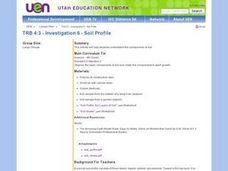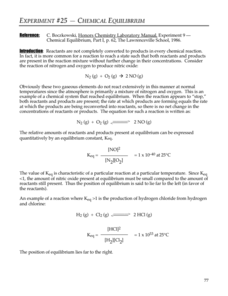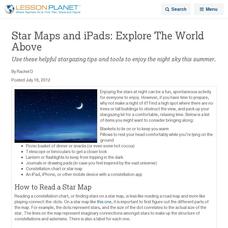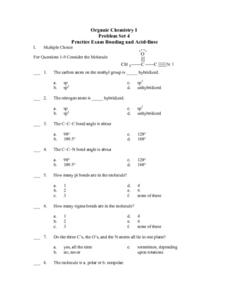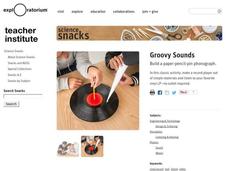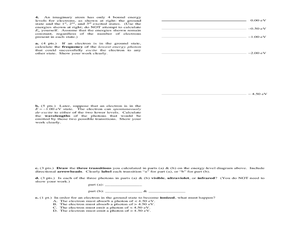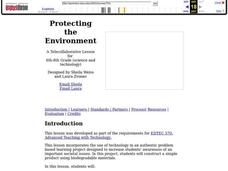Bonneville
DC to AC to DC Efficiency
The power to learn about AC and DC power lies within everyone. The fifth of seven installments in the Off the Grid unit continues the investigation of the efficiency of a USB charger. Individuals use an inverter that converts DC power to...
University of Colorado
Phases of Charon
Pluto, although no longer considered a planet, has five moons. Pluto's moon, Charon, is the focus of a resource that describes how the moon is viewed from the surface of Pluto. Photos help individuals see how Charon would look at...
University of Minnesota
Inquiry Cubes
How do you teach kids to "science" effectively? Inquiry cubes are a "sort of" puzzle with no answer—promoting even more questions! Group members work together to use the evidence on the visible sides of each cube to infer what lies on...
NWT Literacy Council
Readers Theatre Scripts
Engage and entertain young learners with this collection of readers theatre activities. With over 25 different scripts, a wide range of topics are covered from simple counting and rhyming exercises to adaptions of popular children's...
Curated OER
Putting the Ice in Hockey
Eighth grade physical science classes examine why the ice on which hockey is played is slippery. They do so by discussing phases of matter and the molecular motion in each. They read an article on a website and write out answers to 10...
Pleasant Valley Community School District
Integumentary System
This document can be used as a slide show to introduce your human body systems class to the integumentary system, also know as skin. Topics outlined include the roles of skin, details about its its layers, and color (cause and...
Curated OER
Investigation 6 - Soil Profile
Fourth graders study the components of soil. They observe the basic components of soil and relate the components to plant growth. They record color, texture, and kinds of materials on their profile log (light color, denser, grittier -...
Curated OER
Chain Reaction
Students read a magazine on chain reaction and complete an included crossword puzzle. They select one interesting fact they learned and share it with the class, playing a game of truths and lie. Next, the students create 3 statements,...
Teacher Created Materials
A Volcano Awakes
Blow your pupils' minds with information about some of the world's most awesome natural occurrences: volcanos. Class members read a short article and respond to included questions. The focus of the resource is on understanding and...
Rainforest Alliance
Growing a Rainforest in Our Classroom
Give your classroom decor a boost with a rainforest themed mural highlighting what class members learned through their five senses—taste, touch, see, smell, and hear. Scholars create a rainforest filled with trees and animals using their...
Curated OER
Sustainable Agriculture
Students perform an experiment to find out if plants grow best when grown in soil with no fertilizer, with chemical fertilizers, or with compost that they have made themselves. Students discover how agriculture practices can benefit the...
Curated OER
Make a Shadow Clock
Students create a shadow clock. In this time lesson, students make their own shadow clock or sundial from tag board. They place it on the ground and check it every hour to mark where the shadow lies.
Curated OER
How does the Amount of Light Affect a Photogram?
Students observe pictures of themselves using film and discuss how they think the image is processed to produce a photograph. They are introduced to photogram paper comparing it to photograph paper but understanding that no film is...
Curated OER
Investigating the Uses of Backyard Bacteria
Pupils discover that the answers to some of society's waste and clean-up problems may be no further than the soil beneath their feet. They perform a Gram stain on the colonies to determine some of their characteristics.
PBS
Stories of Painkiller Addiction: Learning About Opioids
Feeling high is not the only side effect of abusing prescription opioids. Middle and high schoolers learn more about specific painkillers, including Fentanyl, Oxycodone, and Clonazepam, as well as their common brand names and extensive...
Pingry School
Chemical Equilibrium
We know about the light spectrum, the age spectrum, and sound spectrum, but do chemical reactions also occur on a spectrum? Young scientists experiment with partial reactions on a spectrum and observe the color changes. Then, they...
Curated OER
Star Maps and iPads: Explore The World Above
Use these helpful stargazing tips and tools to enjoy the night sky this summer.
University of Texas
Observing the Moon
Why does it look like there is a man on the moon? Why does the moon look different every night? These are the focus questions of a lesson that prompts class members to observe and record the nightly changes of Earth's natural satellite.
Curated OER
Where is Shirley the Elephant?
Young animal lovers engage in a lesson that's all about elephants. They access an elephant sanctuary website and read a story about Shirley the elephant. They perform a series of activities based upon that story, and also study about the...
Curated OER
Practice Exam Bonding and Acid-Base
In this chemistry worksheet, learners respond to several multiple choice questions relating to bonding and acid-bases. They also identify the various types of bases and how they differ from each other.
Exploratorium
Groovy Sounds
Make music. Class members construct a simple record player using a paper cone and a pin. The resource provides a description of what is happening and why listeners can hear the sounds through the cone.
National Institute of Open Schooling
Chemical Equilibrium
Le Chatelier's interest in thermodynamics and building materials such as cement and plaster led to the Le Chatelier Principle in 1884. Activity 13 in a series of 36 extensively explores chemical equilibrium. Learners read about...
Curated OER
Physics Final Exam, Part A
Here is a comprehensive and cohesive final exam for your high school physicists. A variety of question styles are incorporated, such as multiple-choice and problem-solving. Topics are too many to list, so you will want to review the exam...
Curated OER
Protecting the Environment
Pupils explain what biodegradable materials are and list examples of them. They design, with online partners' feedback and input, a product made of biodegradable materials and develop a marketing campaign to best sell their product.








